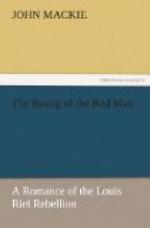It was as if the rebels had suddenly detected an embodied spirit that had worked evil in their midst, for the music stopped, and the excited crew rushed upon her. But Pierre La Chene kept them back. Those proud, defiant eyes had exercised a singular charm over him, and when he saw her face he almost felt ready to fight the whole crowd—almost ready, for, like a good many other lady-killers, Pierre had a very tender regard for his own personal safety. Still, he cried—
“Prenez garde—tek caar! Ma foi, but she can dance it! Let us tek her to Louis Riel. He is at the chapel. We may learn much.”
With her keen instincts, Katie saw the ruse.
“She has the evil eye, and has bewitched Pierre!” she cried, and made as if to lead her old lover away.
But Pierre’s response was to thrust her violently from him. Katie would have fallen but that Dorothy caught her.
“Oh, Katie, poor Katie!” was all she said.
And then the half-breed girl realised the evil she had wrought, and shrunk from the kindly arms of the sister she had betrayed.
“To Riel with her!—to Riel with her!” was the cry of the fickle malcontents, and, with a yelling following at her heels, Dorothy was led away.
CHAPTER VIII
IN THE JUDGMENT HALL
Now that Dorothy knew the worst was about to happen, she, strangely enough, felt more self-possessed than she had done before. These rebels might kill her, or not, just as the mood swayed them, but she would let them see that the daughter of a white man was not afraid.
In that short walk to the chapel she reviewed her position. She hoped that by this time the others had managed to reach the Fort. If they had, then she could face with comparative equanimity what might happen to herself. Her only fear was what her father, in his distress on hearing of her capture, might do.
Fortunately it was not far to the chapel which Riel had converted into his headquarters. Indeed, he was only paying a hurried visit there to exhort the faithful and long-suffering metis and Indians to prompt and decisive action. He intended to go off again in a few hours to Prince Albert to direct the siege against that town. Only those who had witnessed the wantonness and the capture of the “white witch” followed. Most of the rebels were too busy improving the shining hour of unlimited loot. A half-breed on one side and an Indian on the other, each with a dirty mitt on Dorothy’s shoulder, led her to the Judgment Hall of the dusky prophet, Louis David Riel, “stickit priest,” and now malcontent and political agitator by profession. This worthy gentleman had already cost the Government a rebellion, but why he should have been allowed to run to a second is one of those seeming mysteries that can only be accounted for by the too clement policy of a British Government.




